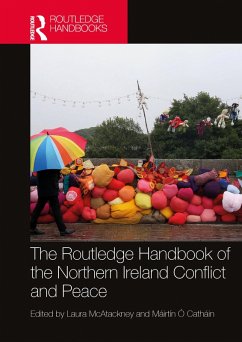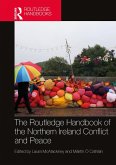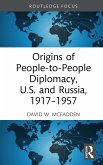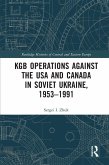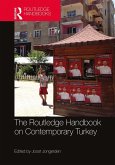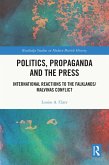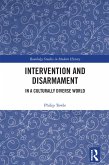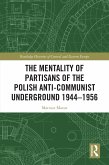The Routledge Handbook of the Northern Ireland Conflict and Peace (eBook, PDF)
Redaktion: McAtackney, Laura; Ó Catháin, Máirtín
45,95 €
45,95 €
inkl. MwSt.
Sofort per Download lieferbar

23 °P sammeln
45,95 €
Als Download kaufen

45,95 €
inkl. MwSt.
Sofort per Download lieferbar

23 °P sammeln
Jetzt verschenken
Alle Infos zum eBook verschenken
45,95 €
inkl. MwSt.
Sofort per Download lieferbar
Alle Infos zum eBook verschenken

23 °P sammeln
The Routledge Handbook of the Northern Ireland Conflict and Peace (eBook, PDF)
Redaktion: McAtackney, Laura; Ó Catháin, Máirtín
- Format: PDF
- Merkliste
- Auf die Merkliste
- Bewerten Bewerten
- Teilen
- Produkt teilen
- Produkterinnerung
- Produkterinnerung

Bitte loggen Sie sich zunächst in Ihr Kundenkonto ein oder registrieren Sie sich bei
bücher.de, um das eBook-Abo tolino select nutzen zu können.
Hier können Sie sich einloggen
Hier können Sie sich einloggen
Sie sind bereits eingeloggt. Klicken Sie auf 2. tolino select Abo, um fortzufahren.

Bitte loggen Sie sich zunächst in Ihr Kundenkonto ein oder registrieren Sie sich bei bücher.de, um das eBook-Abo tolino select nutzen zu können.
With an extensive introduction, preface and 45 individual chapters, this volume represents an ambitious, expansive, interdisciplinary engagement with the North of Ireland through society, conflict and peace from a wide range of disciplinary perspectives, theoretical frameworks and methodological approaches.
- Geräte: PC
- mit Kopierschutz
- eBook Hilfe
Andere Kunden interessierten sich auch für
![The Routledge Handbook of the Northern Ireland Conflict and Peace (eBook, ePUB) The Routledge Handbook of the Northern Ireland Conflict and Peace (eBook, ePUB)]() The Routledge Handbook of the Northern Ireland Conflict and Peace (eBook, ePUB)45,95 €
The Routledge Handbook of the Northern Ireland Conflict and Peace (eBook, ePUB)45,95 €![Origins of People-to-People Diplomacy, U.S. and Russia, 1917-1957 (eBook, PDF) Origins of People-to-People Diplomacy, U.S. and Russia, 1917-1957 (eBook, PDF)]() David W. McFaddenOrigins of People-to-People Diplomacy, U.S. and Russia, 1917-1957 (eBook, PDF)22,95 €
David W. McFaddenOrigins of People-to-People Diplomacy, U.S. and Russia, 1917-1957 (eBook, PDF)22,95 €![KGB Operations against the USA and Canada in Soviet Ukraine, 1953-1991 (eBook, PDF) KGB Operations against the USA and Canada in Soviet Ukraine, 1953-1991 (eBook, PDF)]() Sergei I. ZhukKGB Operations against the USA and Canada in Soviet Ukraine, 1953-1991 (eBook, PDF)42,95 €
Sergei I. ZhukKGB Operations against the USA and Canada in Soviet Ukraine, 1953-1991 (eBook, PDF)42,95 €![The Routledge Handbook on Contemporary Turkey (eBook, PDF) The Routledge Handbook on Contemporary Turkey (eBook, PDF)]() The Routledge Handbook on Contemporary Turkey (eBook, PDF)45,95 €
The Routledge Handbook on Contemporary Turkey (eBook, PDF)45,95 €![Politics, Propaganda and the Press (eBook, PDF) Politics, Propaganda and the Press (eBook, PDF)]() Louise A. ClarePolitics, Propaganda and the Press (eBook, PDF)40,95 €
Louise A. ClarePolitics, Propaganda and the Press (eBook, PDF)40,95 €![Intervention and Disarmament (eBook, PDF) Intervention and Disarmament (eBook, PDF)]() Philip TowleIntervention and Disarmament (eBook, PDF)42,95 €
Philip TowleIntervention and Disarmament (eBook, PDF)42,95 €![The Mentality of Partisans of the Polish Anti-Communist Underground 1944-1956 (eBook, PDF) The Mentality of Partisans of the Polish Anti-Communist Underground 1944-1956 (eBook, PDF)]() Mariusz MazurThe Mentality of Partisans of the Polish Anti-Communist Underground 1944-1956 (eBook, PDF)41,95 €
Mariusz MazurThe Mentality of Partisans of the Polish Anti-Communist Underground 1944-1956 (eBook, PDF)41,95 €-
-
-
With an extensive introduction, preface and 45 individual chapters, this volume represents an ambitious, expansive, interdisciplinary engagement with the North of Ireland through society, conflict and peace from a wide range of disciplinary perspectives, theoretical frameworks and methodological approaches.
Dieser Download kann aus rechtlichen Gründen nur mit Rechnungsadresse in A, B, BG, CY, CZ, D, DK, EW, E, FIN, F, GR, HR, H, IRL, I, LT, L, LR, M, NL, PL, P, R, S, SLO, SK ausgeliefert werden.
Produktdetails
- Produktdetails
- Verlag: Taylor & Francis eBooks
- Seitenzahl: 650
- Erscheinungstermin: 13. November 2023
- Englisch
- ISBN-13: 9781000957730
- Artikelnr.: 68616585
- Verlag: Taylor & Francis eBooks
- Seitenzahl: 650
- Erscheinungstermin: 13. November 2023
- Englisch
- ISBN-13: 9781000957730
- Artikelnr.: 68616585
- Herstellerkennzeichnung Die Herstellerinformationen sind derzeit nicht verfügbar.
Laura McAtackney is Professor in Archaeology at the Radical Humanities Laboratory, University College Cork, Ireland, and Professor in Heritage Studies at Aarhus University, Denmark. She uses contemporary archaeological approaches to understand difficult recent pasts including the Northern Irish conflict and peace process, gendered institutions and colonial legacies. She is the author of An Archaeology of the Troubles: The Dark Heritage of Long Kesh/Maze (2014). Máirtín Ó Catháin is Senior Lecturer in Modern Irish History at the University of Central Lancashire. He has also worked for the Workers' Educational Association and Ulster People's College in Northern Ireland in the past and has specific interests in local labour and social history, oral history, and everyday life approaches to the Northern Irish conflict and peace process.
Introduction. Prologue. PART 1: Debates and controversies. 1. 'Rigorous
impartiality'? The UK Government, Amnesties and Northern Ireland Conflict
Legacy 1998-2022 2. 'The cutting edge of the IRA': the armed struggle North
and South of the Border 3. Collusion 4. 'Getting beyond No': Ulster
loyalist political thought during the Troubles 5. Political Memoir-writing
and Personal Narratives: Researching the Conflictual past in Northern
Ireland 6. Gender and class in Progressive Loyalism 7. Northern Ireland:
still a place apart? PART 2: Environment and the everyday 8. 'The writing
on the wall': the myths of Free Derry, 1968-72 9. 'Everything was concrete:
the everyday impacts of planning and urban redevelopment policy before and
during the Troubles 10. The Troubles, emigration to Britain and
transnational memories of conflict 11. How economists have interpreted the
Troubles 12. Writing the intersections: representing gender and class in
'Troubles' fiction 13. Reconsidering children's experiences of the conflict
in Northern Ireland PART 3: Events and personalities. 14. 'Fidel Castro in
a mini-skirt' or 'St Joan of the Barricades'?: Versions of Bernadette
Devlin McAliskey 15. The strategic transformation of Provisional Irish
Republicanism, c. 1979-1998 16. John Hume and his ideas 17. Catholic
bishops and priests, internationalism and the conflict in Northern Ireland:
the links to Germany 18. Splattered Tunic: Trade Unions in the Northern
Ireland Conflict, 1968-1998 19. Long Kesh / Maze prison: gender, memory and
visuality 20. The Politics of Gender in the Northern Ireland Women's
Coalition PART 4: Strategies and aftermath. 21.'Dissident' Irish
republicanism: keeping the flame alive 22. Policing and peace in Northern
Ireland: Change, conflict and community confidence 23. Everyday
Architectures and Spaces of Territory and Division 24. Sinn Féin and the
IRA Narrative 25. Reconciliation and 'Whataboutery' in Dealing with the
Past in Northern Ireland 26. Beyond Simple Binaries? Reflecting on
Immigrants' Experiences in Northern Ireland 27. Politics, Homophobia and
the Socio-Legal evolution of LGBTQ+ Communities in Northern Ireland. PART
5: Reflective practice. 28. Where am I? Unsettling encounters in
researching memory, subjectivity and conflict transformation after the
Northern Irish Troubles 29. Photography and the Northern Irish Conflict: a
short history 30. Meeting place 31. Curating the Troubles legacy: 'Art can
tread where words and politics often can't' 32. Journalism in Troubled
Times 33. Northern Protestants' Irish ghost limb. PART 6: Heritage and
Memory. 34. The Challenge of Change: Museum Practice Informed by and
Informing the Peace Process 35. The evolution of heritage and memory in a
divided society 36. Exhibiting the Troubles: How museums claims space in
the landscape of post-conflict societies 37. Emblems of the Peace Process:
Conflict-Related Artefacts in Northern Ireland's Heritage Sector 38.
Commemorating Conflict in the Paramilitary Museum 39. Materializing
conflict and peace: presences and absences from the recent past in the
North of Ireland. PART 7: Creative responses. 40. Things Don't Seem Right:
the affective and institutional politics of writing about the North of
Ireland from the North of England. 41. From Trauma to Promise? The state of
Northern Ireland in Post-Agreement Drama 42. Centering the home in the
study of conflict: domestic space, memory and the Troubles 43. Staging
Ground: Temporality and Site-Specificity at Ebrington Barracks 44.
Religious women and the Troubles: an oral history 45. A ghost estate and an
empty grave: the O'Dowd murders and their aftermath.
impartiality'? The UK Government, Amnesties and Northern Ireland Conflict
Legacy 1998-2022 2. 'The cutting edge of the IRA': the armed struggle North
and South of the Border 3. Collusion 4. 'Getting beyond No': Ulster
loyalist political thought during the Troubles 5. Political Memoir-writing
and Personal Narratives: Researching the Conflictual past in Northern
Ireland 6. Gender and class in Progressive Loyalism 7. Northern Ireland:
still a place apart? PART 2: Environment and the everyday 8. 'The writing
on the wall': the myths of Free Derry, 1968-72 9. 'Everything was concrete:
the everyday impacts of planning and urban redevelopment policy before and
during the Troubles 10. The Troubles, emigration to Britain and
transnational memories of conflict 11. How economists have interpreted the
Troubles 12. Writing the intersections: representing gender and class in
'Troubles' fiction 13. Reconsidering children's experiences of the conflict
in Northern Ireland PART 3: Events and personalities. 14. 'Fidel Castro in
a mini-skirt' or 'St Joan of the Barricades'?: Versions of Bernadette
Devlin McAliskey 15. The strategic transformation of Provisional Irish
Republicanism, c. 1979-1998 16. John Hume and his ideas 17. Catholic
bishops and priests, internationalism and the conflict in Northern Ireland:
the links to Germany 18. Splattered Tunic: Trade Unions in the Northern
Ireland Conflict, 1968-1998 19. Long Kesh / Maze prison: gender, memory and
visuality 20. The Politics of Gender in the Northern Ireland Women's
Coalition PART 4: Strategies and aftermath. 21.'Dissident' Irish
republicanism: keeping the flame alive 22. Policing and peace in Northern
Ireland: Change, conflict and community confidence 23. Everyday
Architectures and Spaces of Territory and Division 24. Sinn Féin and the
IRA Narrative 25. Reconciliation and 'Whataboutery' in Dealing with the
Past in Northern Ireland 26. Beyond Simple Binaries? Reflecting on
Immigrants' Experiences in Northern Ireland 27. Politics, Homophobia and
the Socio-Legal evolution of LGBTQ+ Communities in Northern Ireland. PART
5: Reflective practice. 28. Where am I? Unsettling encounters in
researching memory, subjectivity and conflict transformation after the
Northern Irish Troubles 29. Photography and the Northern Irish Conflict: a
short history 30. Meeting place 31. Curating the Troubles legacy: 'Art can
tread where words and politics often can't' 32. Journalism in Troubled
Times 33. Northern Protestants' Irish ghost limb. PART 6: Heritage and
Memory. 34. The Challenge of Change: Museum Practice Informed by and
Informing the Peace Process 35. The evolution of heritage and memory in a
divided society 36. Exhibiting the Troubles: How museums claims space in
the landscape of post-conflict societies 37. Emblems of the Peace Process:
Conflict-Related Artefacts in Northern Ireland's Heritage Sector 38.
Commemorating Conflict in the Paramilitary Museum 39. Materializing
conflict and peace: presences and absences from the recent past in the
North of Ireland. PART 7: Creative responses. 40. Things Don't Seem Right:
the affective and institutional politics of writing about the North of
Ireland from the North of England. 41. From Trauma to Promise? The state of
Northern Ireland in Post-Agreement Drama 42. Centering the home in the
study of conflict: domestic space, memory and the Troubles 43. Staging
Ground: Temporality and Site-Specificity at Ebrington Barracks 44.
Religious women and the Troubles: an oral history 45. A ghost estate and an
empty grave: the O'Dowd murders and their aftermath.
Introduction. Prologue. PART 1: Debates and controversies. 1. 'Rigorous
impartiality'? The UK Government, Amnesties and Northern Ireland Conflict
Legacy 1998-2022 2. 'The cutting edge of the IRA': the armed struggle North
and South of the Border 3. Collusion 4. 'Getting beyond No': Ulster
loyalist political thought during the Troubles 5. Political Memoir-writing
and Personal Narratives: Researching the Conflictual past in Northern
Ireland 6. Gender and class in Progressive Loyalism 7. Northern Ireland:
still a place apart? PART 2: Environment and the everyday 8. 'The writing
on the wall': the myths of Free Derry, 1968-72 9. 'Everything was concrete:
the everyday impacts of planning and urban redevelopment policy before and
during the Troubles 10. The Troubles, emigration to Britain and
transnational memories of conflict 11. How economists have interpreted the
Troubles 12. Writing the intersections: representing gender and class in
'Troubles' fiction 13. Reconsidering children's experiences of the conflict
in Northern Ireland PART 3: Events and personalities. 14. 'Fidel Castro in
a mini-skirt' or 'St Joan of the Barricades'?: Versions of Bernadette
Devlin McAliskey 15. The strategic transformation of Provisional Irish
Republicanism, c. 1979-1998 16. John Hume and his ideas 17. Catholic
bishops and priests, internationalism and the conflict in Northern Ireland:
the links to Germany 18. Splattered Tunic: Trade Unions in the Northern
Ireland Conflict, 1968-1998 19. Long Kesh / Maze prison: gender, memory and
visuality 20. The Politics of Gender in the Northern Ireland Women's
Coalition PART 4: Strategies and aftermath. 21.'Dissident' Irish
republicanism: keeping the flame alive 22. Policing and peace in Northern
Ireland: Change, conflict and community confidence 23. Everyday
Architectures and Spaces of Territory and Division 24. Sinn Féin and the
IRA Narrative 25. Reconciliation and 'Whataboutery' in Dealing with the
Past in Northern Ireland 26. Beyond Simple Binaries? Reflecting on
Immigrants' Experiences in Northern Ireland 27. Politics, Homophobia and
the Socio-Legal evolution of LGBTQ+ Communities in Northern Ireland. PART
5: Reflective practice. 28. Where am I? Unsettling encounters in
researching memory, subjectivity and conflict transformation after the
Northern Irish Troubles 29. Photography and the Northern Irish Conflict: a
short history 30. Meeting place 31. Curating the Troubles legacy: 'Art can
tread where words and politics often can't' 32. Journalism in Troubled
Times 33. Northern Protestants' Irish ghost limb. PART 6: Heritage and
Memory. 34. The Challenge of Change: Museum Practice Informed by and
Informing the Peace Process 35. The evolution of heritage and memory in a
divided society 36. Exhibiting the Troubles: How museums claims space in
the landscape of post-conflict societies 37. Emblems of the Peace Process:
Conflict-Related Artefacts in Northern Ireland's Heritage Sector 38.
Commemorating Conflict in the Paramilitary Museum 39. Materializing
conflict and peace: presences and absences from the recent past in the
North of Ireland. PART 7: Creative responses. 40. Things Don't Seem Right:
the affective and institutional politics of writing about the North of
Ireland from the North of England. 41. From Trauma to Promise? The state of
Northern Ireland in Post-Agreement Drama 42. Centering the home in the
study of conflict: domestic space, memory and the Troubles 43. Staging
Ground: Temporality and Site-Specificity at Ebrington Barracks 44.
Religious women and the Troubles: an oral history 45. A ghost estate and an
empty grave: the O'Dowd murders and their aftermath.
impartiality'? The UK Government, Amnesties and Northern Ireland Conflict
Legacy 1998-2022 2. 'The cutting edge of the IRA': the armed struggle North
and South of the Border 3. Collusion 4. 'Getting beyond No': Ulster
loyalist political thought during the Troubles 5. Political Memoir-writing
and Personal Narratives: Researching the Conflictual past in Northern
Ireland 6. Gender and class in Progressive Loyalism 7. Northern Ireland:
still a place apart? PART 2: Environment and the everyday 8. 'The writing
on the wall': the myths of Free Derry, 1968-72 9. 'Everything was concrete:
the everyday impacts of planning and urban redevelopment policy before and
during the Troubles 10. The Troubles, emigration to Britain and
transnational memories of conflict 11. How economists have interpreted the
Troubles 12. Writing the intersections: representing gender and class in
'Troubles' fiction 13. Reconsidering children's experiences of the conflict
in Northern Ireland PART 3: Events and personalities. 14. 'Fidel Castro in
a mini-skirt' or 'St Joan of the Barricades'?: Versions of Bernadette
Devlin McAliskey 15. The strategic transformation of Provisional Irish
Republicanism, c. 1979-1998 16. John Hume and his ideas 17. Catholic
bishops and priests, internationalism and the conflict in Northern Ireland:
the links to Germany 18. Splattered Tunic: Trade Unions in the Northern
Ireland Conflict, 1968-1998 19. Long Kesh / Maze prison: gender, memory and
visuality 20. The Politics of Gender in the Northern Ireland Women's
Coalition PART 4: Strategies and aftermath. 21.'Dissident' Irish
republicanism: keeping the flame alive 22. Policing and peace in Northern
Ireland: Change, conflict and community confidence 23. Everyday
Architectures and Spaces of Territory and Division 24. Sinn Féin and the
IRA Narrative 25. Reconciliation and 'Whataboutery' in Dealing with the
Past in Northern Ireland 26. Beyond Simple Binaries? Reflecting on
Immigrants' Experiences in Northern Ireland 27. Politics, Homophobia and
the Socio-Legal evolution of LGBTQ+ Communities in Northern Ireland. PART
5: Reflective practice. 28. Where am I? Unsettling encounters in
researching memory, subjectivity and conflict transformation after the
Northern Irish Troubles 29. Photography and the Northern Irish Conflict: a
short history 30. Meeting place 31. Curating the Troubles legacy: 'Art can
tread where words and politics often can't' 32. Journalism in Troubled
Times 33. Northern Protestants' Irish ghost limb. PART 6: Heritage and
Memory. 34. The Challenge of Change: Museum Practice Informed by and
Informing the Peace Process 35. The evolution of heritage and memory in a
divided society 36. Exhibiting the Troubles: How museums claims space in
the landscape of post-conflict societies 37. Emblems of the Peace Process:
Conflict-Related Artefacts in Northern Ireland's Heritage Sector 38.
Commemorating Conflict in the Paramilitary Museum 39. Materializing
conflict and peace: presences and absences from the recent past in the
North of Ireland. PART 7: Creative responses. 40. Things Don't Seem Right:
the affective and institutional politics of writing about the North of
Ireland from the North of England. 41. From Trauma to Promise? The state of
Northern Ireland in Post-Agreement Drama 42. Centering the home in the
study of conflict: domestic space, memory and the Troubles 43. Staging
Ground: Temporality and Site-Specificity at Ebrington Barracks 44.
Religious women and the Troubles: an oral history 45. A ghost estate and an
empty grave: the O'Dowd murders and their aftermath.
